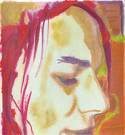Ruth A. Lanius
M.D., Ph.D., F.R.C.P.(C)
|
|
|
Current projects Dr. Lanius is working on include:
|
|
Mother-Child Attachment
First-time mothers with stress-related disorders will complete a series of questionnaires and interviews and be videotaped in interaction with their children in a variety of situations in the home and at the university and will also view videos of their own infants and of another infant during a 3.0T fMRI scan in order to investigate differences in neural functioning and attachment relationships in women with stress-related disorders, as compared to control subjects who are also first-time mothers. By observing differences in mothers’ and infants’ behaviour and in the neural correlates of mothers’ response to their infants over time we will be able to compare development of healthy mother-infant relationships with those seen in mothers who cannot form an adequate attachment relationship with their infants. (Top) |
|
Pain Perception
This translational project combines a well-established thermal pain paradigm with functional magnetic resonance imaging (fMRI) to study the neural correlates of altered pain processing in PTSD and in borderline personality disorder (BPD). The design examines how the distress associated with trauma recall influences pain-induced neural activation, using the trauma script-driven imagery paradigm. This project is based on clinical and behavioural observations in PTSD and PTSD+BPD patients, together with neuroimaging studies of pain in a healthy population and symptom provocation studies in PTSD and PTSD+BPD patients that indicate that similar brain regions are involved in both pain (particularly its affective aspect) and in the recall of traumatic experiences in PTSD. (Top) |
|
Self Awareness & Self Recognition
Patients with PTSD and/or BPD will have a 3.0 Tesla fMRI to investigate differences in brain activity from normal volunteers during self-reflection and related cognitive conditions. Tasks requiring the subjects to answer yes or no to a series of questions, including general knowledge questions, questions about themselves that do not require self-reflection, and “self-reflection” questions. This study aims to elucidate the clinical finding that patients with PTSD and/or BPD often report an unformed and unstable “sense of self.”
Patients with PTSD related to chronic interpersonal trauma will have a 3.0 Tesla fMRI to investigate differences in brain activity from normal volunteers during self-recognition and related cognitive conditions. Subjects view images of their own face and other faces. (Top) |
|
Social Cognition
People who have PTSD may have difficulty understanding their own thoughts and feelings, as well as those of other people. This can affect social interactions and quality of life. Participants complete a variety of interviews, questionnaires, and computer tasks. Questionnaires and tasks are used to see how participants deal with social situations, interactions and moral judgments. (Top)
|
|
Stress, Trauma and Recovery: Early Stage Study
This study will integrate clinical, physiological and neuroimaging methods in order to investigate early markers for the development of Posttraumatic Stress Disorder (PTSD) in susceptible individuals and will contribute toward the development of a model of the etiology of PTSD. Subjects are recruited in the emergency department following a traumatic event and are followed prospectively at two weeks, six weeks and three months post-trauma. One area that has been neglected in the PTSD neuroimaging literature is the lack of correlational studies between autonomic function, stress hormones, opioids and changes in brain activation as determined by neuroimaging. (Top) |
|
Ruth A. Lanius, M.D., Ph.D.
Department of Psychiatry
London Health Sciences Centre
339 Windermere Rd., PO Box 5339
London, Ontario, N6A 5A5, Canada |
Tel: (519) 663-3306
Fax: (519) 663-3202
E-mail: ruth.lanius@lhsc.on.ca |
|




